Elections
Profile: Doug Greco for mayor
First-ever opportunity to elect appraisal board members
They’re off and running for council
Fair Campaign Funds Allocated Unfairly
Fair Campaign Funds Allocated Unfairly
Two of the three candidates who split the money
may not be entitled, city rules are in question
Investigative Report by Ken Martin
© The Austin Bulldog 2014
Posted Monday December 1, 2014 5:17pm
 The Austin City Clerk deemed three candidates in the City Council runoffs eligible for equal shares of the $83,965.74 held in the Austin Fair Campaign Finance Fund, which provides partial public support for qualifying candidates. The Fund is built through lobbyist registration fees, donations, money collected for violations of campaign contracts, and candidate filing fees.
The Austin City Clerk deemed three candidates in the City Council runoffs eligible for equal shares of the $83,965.74 held in the Austin Fair Campaign Finance Fund, which provides partial public support for qualifying candidates. The Fund is built through lobbyist registration fees, donations, money collected for violations of campaign contracts, and candidate filing fees.
District 3 candidates (and siblings) Susana Almanza and Sabino Renteria and District 7 candidate Leslie Pool were notified November 14 they would each get checks for $27,988.58, City Clerk Jannette Goodall told The Austin Bulldog. They picked up the checks between November 18 and 21, she said.
None of the other candidates involved in runoffs for mayor and council signed the voluntary Austin Fair Campaign Contract.

 Almanza and Renteria, however, may not have been entitled to those funds because they signed the Austin Fair Campaign Contract too late, according to one City Code provision.
Almanza and Renteria, however, may not have been entitled to those funds because they signed the Austin Fair Campaign Contract too late, according to one City Code provision.
To be eligible for a share of the Austin Fair Campaign Finance Fund, City Code Section 2-2-11 requires that candidates must sign the Austin Fair Campaign Contract agreeing to abide by limitations on contributions and expenditures and to participate in a series of candidate forums.
Section 2-2-11(B) states “A candidate must personally sign the campaign contract the earlier of (emphasis added):
(1) 30 days after he or she becomes a candidate under the Texas Election Code; or
(2) the date the candidate files for a place on the ballot.
Goodall said she had consulted with the Law Department and Ethics Review Commission and followed the same procedure used in past elections to disburse money to these three candidates based on the dates they filed for a place on the ballot.
“We had always used the ballot application deadline as a trigger and we kept with that date as well for this election,” Goodall said.
Tradition trumped City Code
Downtown Alliance Rail Spending Questioned
Downtown Alliance Rail Spending Questioned
Civic activist Rodgers warns City of Austin not to
reimburse $440,000 in Let’s Go Austin contributions
by Ken Martin
© The Austin Bulldog 2014
Posted Tuesday November 25, 2014 10:09pm
 Civic activist Brian Rodgers sent a letter to City Manager Marc Ott and other city officials today to urge the city not to reimburse the DAA for political contributions it made to a pro-rail campaign as such payments might entail a “potential criminal violation.”
Civic activist Brian Rodgers sent a letter to City Manager Marc Ott and other city officials today to urge the city not to reimburse the DAA for political contributions it made to a pro-rail campaign as such payments might entail a “potential criminal violation.”
The Downtown Austin Alliance (DAA) contributed a total of $440,000 to the Let’s Go Austin Political Action Committee (PAC) to help fund the pro-rail campaign, according to campaign finance reports filed by the PAC.
The November 4 election sought approval for a $600 million bond for an urban rail starter system if the city also provided $400 million for roadway improvement projects. Voters soundly defeated the $1 billion initiative by a vote of 108,396 (57.2 percent) to 81,107 (42.8 percent).
 DAA Executive Director Charlie Betts said he has been with the DAA for 17 years and this is the first time a question has been raised about the organization making political contributions.
DAA Executive Director Charlie Betts said he has been with the DAA for 17 years and this is the first time a question has been raised about the organization making political contributions.
Betts said, “We have contributed to issue-oriented PACs many times in the past, such as the Health District, the last two transportation bond issues, and the PAC to support the last affordable housing bonds campaign. We have never contributed to a political candidate.”
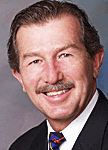 “That doesn’t make it legal, it just means they didn’t get caught,” said Austin attorney Bill Aleshire of Riggs Aleshire & Ray PC, who assisted Rodgers in drafting the letter to city officials. “The fact they got away with it in the past doesn’t make it any less of an issue.” (Disclosure: Aleshire is one of the attorneys who represents The Austin Bulldog.)
“That doesn’t make it legal, it just means they didn’t get caught,” said Austin attorney Bill Aleshire of Riggs Aleshire & Ray PC, who assisted Rodgers in drafting the letter to city officials. “The fact they got away with it in the past doesn’t make it any less of an issue.” (Disclosure: Aleshire is one of the attorneys who represents The Austin Bulldog.)
How DAA is funded
Austin Political Power to Shift Radically
Austin Political Power to Shift Radically
Interactive maps show historic achievements afoot
in 10-1 system of City Council representation
by Ken Martin
© The Austin Bulldog 2014
Posted Tuesday November 18, 2014 8:07pm
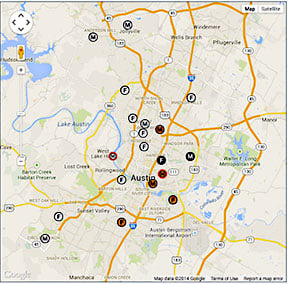 Suburban sprawl will overtake Austin City Hall when the new mayor and 10 City Council members are inaugurated January 6.
Suburban sprawl will overtake Austin City Hall when the new mayor and 10 City Council members are inaugurated January 6.
Other significant trends are that for the first time women are almost certain to outnumber men on the council; whites will still outnumber people of color but Hispanics will have more representation than ever, including the first-ever Latina; areas never before represented will finally have a seat on the dais; Republicans may gain a foothold; and the near-stranglehold on political power that the Westside has enjoyed for decades will be ended. (More about all these later.)
These are some of the trends evident in The Austin Bulldog’s 2014 interactive map of those already elected or engaged in a runoff as a result of the November 4, 2014, general election.
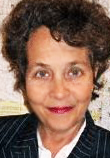 Linda Curtis, the Austinites for Geographic Representation sparkplug who led the volunteer petition drive that got the 10-1 plan on the ballot, said, “It's obvious that we have accomplished with 10-1 the immediate goal, which was to have representatives in these districts. The real question is, ‘So what?’ Is business going to change? We'll see.”
Linda Curtis, the Austinites for Geographic Representation sparkplug who led the volunteer petition drive that got the 10-1 plan on the ballot, said, “It's obvious that we have accomplished with 10-1 the immediate goal, which was to have representatives in these districts. The real question is, ‘So what?’ Is business going to change? We'll see.”
“What does it mean to have representation that's still under the influence of the old political players—and to what extent that's still in place will be seen when the new council takes seats in January,” Curtis said. “In politics it's always about the future and what people actually do.”
Two Women Win Without Runoffs
Two Women Win Without Runoffs
Delia Garza Austin’s first Latina council member,
former state representative Ann Kitchen also victorious
by Ken Martin
© The Austin Bulldog 2014
Posted Wednesday November 5, 2014 4:39pm
Two female candidates won seats on the Austin City Council in yesterday’s election, while the mayor and eight other council seats will be decided in a runoff election December 16.
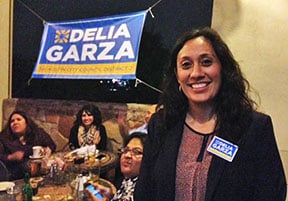 District 2 council candidate Delia Garza gained a place in history by becoming the first Latina elected to the City Council.
District 2 council candidate Delia Garza gained a place in history by becoming the first Latina elected to the City Council.
Garza thumped her three opponents by gaining 65.01 percent of the votes while her nearest competitor got just 16.53 percent. “I am honored to be the first Latina elected,” Garza told The Austin Bulldog as her party was winding down at Trudy’s restaurant off South I-35. “It’s been a long time coming.”
It has taken nearly four decades for Latin women to achieve political parity with their male counterparts. The first Latino won a seat on the council 39 years ago, when John Trevino Jr. was elected in 1975.
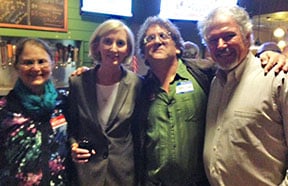 District 5 candidate Ann Kitchen netted 53.62 percent to beat six opponents. Her nearest opponent, Mike Rodriguez, was a distant second at 22.21 percent. Although the votes were not final when The Austin Bulldog stopped by Kitchen’s party at Red’s Front Porch on South Lamar a little before 9pm, she was edging over 50 percent and the crowd was enthusiastic.
District 5 candidate Ann Kitchen netted 53.62 percent to beat six opponents. Her nearest opponent, Mike Rodriguez, was a distant second at 22.21 percent. Although the votes were not final when The Austin Bulldog stopped by Kitchen’s party at Red’s Front Porch on South Lamar a little before 9pm, she was edging over 50 percent and the crowd was enthusiastic.
Kitchen’s husband, Mark Yznaga, anticipating the possibility she would win without a runoff, told The Austin Bulldog if she did so he would resign his position with Opticos Design Inc., the lead urban planning consultant for the City of Austin’s CodeNEXT project.
Runoff candidates and indy backers
PACs Indy Spending Tops $262,000
PACs Indy Spending Tops $262,000
Another $68,000 dumped into campaigns
in last three days to back favored candidates
by Ken Martin
© The Austin Bulldog 2014
Posted Monday November 3, 2014 1:40pm
Local political action committees (PACs) have already spent more than a quarter-million dollars trying to influence the outcome of the mayor and City Council elections set for Tuesday November 4.
 For the pick of the big-money PACs look no further than District 10 candidate Robert Thomas. He has garnered nearly $60,000 in independent expenditures, so far, including a whopping $50,000 from the Austin Board of Realtors—a sum that far exceeds the total amount of independent expenditures made on behalf of any other candidate. The rest of support for Thomas came from the Austin Firefighters Association, Austin Police Association, and some free billboards courtesy of Reagan National Advertising.
For the pick of the big-money PACs look no further than District 10 candidate Robert Thomas. He has garnered nearly $60,000 in independent expenditures, so far, including a whopping $50,000 from the Austin Board of Realtors—a sum that far exceeds the total amount of independent expenditures made on behalf of any other candidate. The rest of support for Thomas came from the Austin Firefighters Association, Austin Police Association, and some free billboards courtesy of Reagan National Advertising.
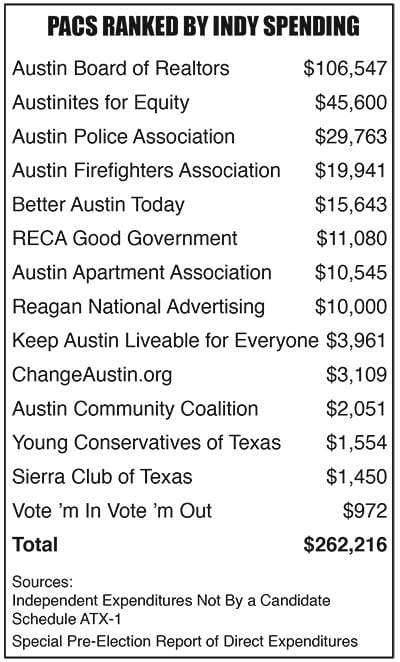 Total independent expenditures jumped almost $68,000 in just the last three days of reporting as PACs chipped in to push last-minute ads, mailers, phone banks and block walkers aimed at getting preferred candidates elected. Of if not elected outright, at least getting them into a runoff where independent expenditures may be even more effective in influencing who serves as the new mayor and fills 10 council seats.
Total independent expenditures jumped almost $68,000 in just the last three days of reporting as PACs chipped in to push last-minute ads, mailers, phone banks and block walkers aimed at getting preferred candidates elected. Of if not elected outright, at least getting them into a runoff where independent expenditures may be even more effective in influencing who serves as the new mayor and fills 10 council seats.
While amounts already spent are significant and might make a difference in the outcome of the general election, these PACs are sitting on more than $800,000 that can be deployed to influence voters in the seven weeks of campaigning to come, after the November 4 general election and before the December 16 runoffs.
Independent expenditures are monies spent for electioneering communication or express advocacy to support or oppose a candidate without consulting with a candidate’s campaign.
 Political consultant Peck Young is advising a number of council candidates in this election, some of which have gotten support through independent expenditures.
Political consultant Peck Young is advising a number of council candidates in this election, some of which have gotten support through independent expenditures.
“As long as you have ridiculously low limits on campaign contributions you need some mechanism to support candidates and that's what these independent expenditures are for,” Young said. “Until we get rational contribution levels these independent expenditures are it.”







